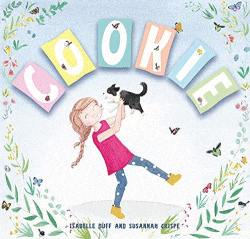
Cookie
Cookie
Isabelle Duff
Susannah Crisp
EK Books, 2021
32pp., hbk., RRP $A24.99
9781925820959
Right from the time he poked his head out of a shaky cardboard box on the back seat of the car, Cookie the Border Collie puppy loves Girl more than anything. At first, it’s because she has a ball but it’s soon so much more than that. With the boy called Stopit (and sometimes Shoosh) they go on walks to find the yummiest smells (with Cookie on a lead so Girl doesn’t get lost) and at night they both sleep in a cuddle.
But sometimes Girl got really sad and didn’t want to play, a sadness so profound that it made her family sad too, and Cookie learns that cuddles and licks are even better than playing – because everyone knows you can lick sadness off. But while the underlying causes of Girl’s sadness remain, she understands that Cookie is her responsibility and that she needs to get out of bed to attend to Cookie’s needs. She has purpose…
Written by a 19 year old, this is Isabelle Duff’s first picture book and she has drawn on her own experiences as a young student with depression, anxiety and anorexia and her parents buying her a puppy to portray Girl and Cookie. While she sought professional help, she found that there was a stigma attached to that by her peers so while the relationship between Girl and Cookie is a pared down version of her relationship with her own Saffy, it is one that not only will young children relate to but it also makes the issue of mental health accessible so conversations can start and perhaps start to break down that stigma. This is particularly important as the “shadow pandemic” of mental health continues in our young as much as those who are older, but they don’t necessarily have the words to articulate their concerns.
Despite the focus there has been on children’s mental health in recent years, clearly there is still shame associated with it and so by telling the story through Cookie’s voice, setting it in a typical family setting with a light touch of humour and through the interactions of all, demonstrating how Girl’s moods impact on the whole family, Duff shows that this is something that can affect any family and anybody within it.
The acceptance by educators that childhood mental health is a significant issue means there have been a variety of stories and programs that address it but if we are to have mental illness as “acceptable” as physical illness then the more stories our students hear, the more conversations we have then the more effective we can be so this is another valuable addition to the collection. . To help this, teachers’ notes are available
